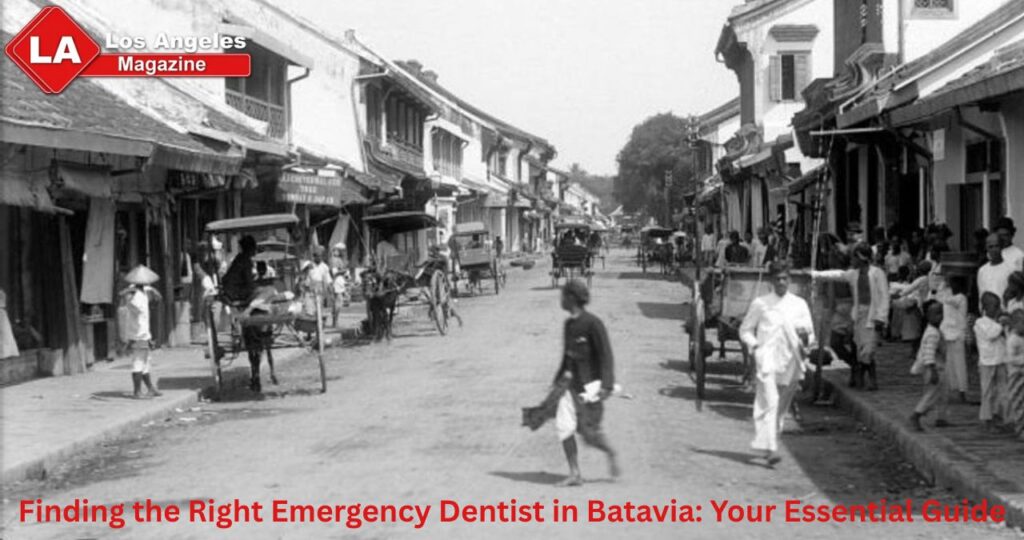Finding yourself with a sudden toothache or dental injury can be really stressful. Knowing how to choose the right emergency dentist in Batavia, NY, can make a huge difference in getting quick and effective care. It’s not just about finding someone who can see you right away; it’s about finding a dentist you can trust to handle your specific situation with skill and compassion.
Understanding Emergency Dental Services
Emergency dental services cover a range of urgent issues that need immediate attention. These can include severe toothaches, broken or knocked-out teeth, infections, and uncontrolled bleeding. It’s important to know what constitutes a dental emergency so you can seek help promptly. Not every dental issue is an emergency, but if you’re experiencing severe pain or have suffered a trauma to the mouth, it’s best to err on the side of caution and contact an emergency dentist.
Evaluating Dentist Credentials
When choosing an emergency dentist, it’s important to check their credentials. Make sure they are licensed and in good standing with the relevant dental boards. Look for dentists with experience in handling emergency cases. You can often find this information on their website or by calling their office. Don’t hesitate to ask about their qualifications and experience – it’s your right to know who is providing your care.
Reading Patient Reviews
Patient reviews can offer valuable insights into the quality of care provided by a dentist. Check online review platforms to see what other patients have to say about their experiences. Look for patterns in the reviews – are patients consistently praising the dentist’s skill and bedside manner, or are there recurring complaints about long wait times or poor communication? While every patient’s experience is unique, reviews can give you a general sense of what to expect.
Choosing the right dentist is a personal decision. Take your time, do your research, and don’t be afraid to ask questions. Your oral health is important, and finding a dentist you trust is key to maintaining a healthy smile.
Key Services Offered by Emergency Dentists
Emergency dentists are ready to handle a range of urgent dental problems. It’s good to know what they can do if you suddenly have a toothache or injury.
Understanding Emergency Dental Services
Emergency dental services are for problems that need immediate attention. This usually includes severe pain, bleeding, or infections that can’t wait for a regular appointment. These dentists are equipped to deal with situations that could get worse if not treated quickly. They can provide relief and prevent further damage.
Pain Management Techniques
One of the main things emergency dentists do is manage pain. They have several ways to help, including:
- Local anesthetics to numb the area.
- Prescription pain medicine for after the visit.
- Techniques to calm anxious patients.
It’s important to tell your dentist about any allergies or medical conditions you have so they can choose the safest and most effective pain relief method for you.
Common Emergency Procedures
Emergency dentists perform a variety of procedures, such as:
- Tooth Extractions: Removing a tooth that is severely damaged or infected.
- Repairing Broken Teeth: Fixing teeth that have been chipped, cracked, or fractured.
- Treating Infections: Draining abscesses and prescribing antibiotics.
- Addressing Soft Tissue Injuries: Repairing cuts or lacerations to the gums, tongue, or cheeks.
- Replanting Avulsed Teeth: Attempting to reinsert a tooth that has been knocked out.
Follow-Up Care and Support
After the emergency treatment, dentists also provide follow-up care. This might include:
- Instructions on how to care for your mouth at home.
- Scheduling a follow-up appointment to check on healing.
- Referrals to specialists if needed.
It’s important to follow the dentist’s instructions carefully to make sure everything heals properly and to prevent future problems.
What to Look for in an Emergency Dentist
Finding an emergency dentist when you’re in pain can be stressful. You want someone who’s not only skilled but also available and understanding. Here’s what I think is important:
Availability and Response Time
When you’re dealing with a dental emergency, time is of the essence. Look for a dentist who offers same-day appointments or has after-hours availability. A quick response can make all the difference in saving a tooth or alleviating severe pain. It’s also worth checking if they have a system for handling emergency calls promptly, like a dedicated emergency line or a quick online booking option.
Location and Accessibility
Think about how easy it is to get to the dentist’s office, especially if you’re in pain. A location that’s close to your home or work can be a lifesaver. Also, consider things like parking and public transportation options. A dentist with convenient hours and a location that’s easy to reach will make the whole experience less stressful.
Insurance and Payment Options
Dental work can be expensive, and emergency treatments are no exception. Before you commit to a dentist, find out what insurance plans they accept and what payment options they offer. Some dentists have payment plans or work with financing companies to help you manage the cost. Don’t be afraid to ask about pricing upfront so you know what to expect.
It’s a good idea to call your insurance provider beforehand to understand your coverage for emergency dental services. Knowing what your policy covers can help you avoid unexpected bills and make informed decisions about your treatment.
Preparing for an Emergency Dental Visit
Gathering Necessary Information
Okay, so you’ve got a dental emergency brewing. Before you rush out the door, take a sec to gather some info. Knowing a few key details can really help your dentist get you sorted out faster. Think about when the problem started, what makes it worse, and what, if anything, makes it better. Also, jot down any medications you’re currently taking and any allergies you have. This is super important because some medications can interact, and allergies are always good for your dentist to know about. If you’ve seen a dentist recently, try to remember when and what was done. The more info you can give, the better!
What to Expect During Your Visit
Walking into an emergency dental appointment can feel a bit stressful, but knowing what’s coming can ease your nerves. First off, expect some paperwork. You’ll likely need to fill out forms about your medical history and insurance. Then, the dentist will chat with you about what’s going on. They’ll examine your mouth, probably take some X-rays to get a better look, and then explain what needs to be done. Don’t be afraid to ask questions! It’s your mouth, and you deserve to know what’s happening. They’ll probably focus on getting you out of pain first, and then discuss a longer-term plan if needed.
Questions to Ask Your Dentist
It’s always a good idea to have a few questions ready for your dentist. Here are some ideas:
- What exactly is causing this problem?
- What are my treatment options, and what are the pros and cons of each?
- How much will this cost, and what does my insurance cover?
- What can I do at home to manage the pain until I can get proper treatment?
- What are the risks associated with this procedure?
Asking questions shows you’re engaged in your dental health, and it helps you make informed decisions. Don’t feel like you’re bothering them; it’s their job to help you understand what’s going on and what your options are.
Aftercare Following an Emergency Dental Visit
Managing Pain and Discomfort
Okay, so you’ve just left the dentist in Batavia, NY, and you’re probably still feeling a bit off. The first 24-48 hours are key for managing pain. Here’s what I usually do:
- Take pain medication as prescribed. Don’t wait for the pain to get bad before popping a pill.
- Use a cold compress. Wrap an ice pack in a towel and apply it to the outside of your cheek for 15-20 minutes at a time. This helps with swelling and numbs the area.
- Stick to soft foods. Think yogurt, soup, mashed potatoes – anything that doesn’t require a lot of chewing.
Remember to keep your head elevated when resting. This can also help reduce swelling and discomfort.
Signs of Complications to Watch For
Most of the time, things go smoothly after an emergency dental visit, but it’s important to keep an eye out for potential problems. Here’s a quick rundown of what to watch for:
- Increased pain or swelling after the first few days.
- Fever or chills.
- Pus or discharge from the treated area.
- Numbness that doesn’t go away.
If you notice any of these, call your dentist right away. It’s always better to be safe than sorry.
When to Schedule a Follow-Up
Your emergency dentist will probably tell you when to come back for a follow-up appointment. Don’t skip this! It’s super important for making sure everything is healing correctly and to address any underlying issues that caused the emergency in the first place. Usually, it’s scheduled within a week or two after the initial visit. They’ll check the area, make sure there’s no infection, and discuss any further treatment you might need. Think of it as a check-up after a repair job – you want to make sure everything’s solid.
Local Resources for Emergency Dental Care
Community Health Clinics
Community health clinics can be a real lifesaver, especially if you’re on a tight budget or don’t have dental insurance. These clinics often provide dental services on a sliding scale, meaning the cost is based on your income. It’s worth checking if there’s a clinic near you that offers emergency dental care. You might have to wait a bit for an appointment, but it’s often a much more affordable option than a private practice. Plus, they usually have really dedicated staff who are committed to helping people get the care they need.
Dental Associations and Hotlines
Dental associations can be a great resource when you’re trying to find an emergency dentist in a hurry. They often have referral services that can connect you with local dentists who are available to see patients on short notice. Some associations even operate hotlines that you can call for advice and guidance on how to handle a dental emergency. It’s like having a dental expert on standby! They can also provide information on low-cost dental care options and other resources in your area.
Online Reviews and Recommendations
Okay, let’s be real, everyone checks online reviews before trying a new restaurant, right? Well, the same goes for finding an emergency dentist! Sites like Yelp and Google Reviews can give you a sense of other people’s experiences with different dentists in Batavia. Pay attention to what people say about the dentist’s availability, their bedside manner, and the quality of their work.
Just remember to take everything with a grain of salt – everyone’s experience is different. But reading reviews can definitely help you narrow down your options and find a dentist who’s a good fit for you.



